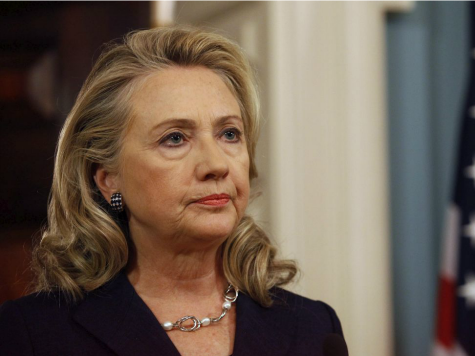
The Daily Beast was frothing at the mouth Thursday about the sexist attacks on Hillary Clinton. Yes, the sexist attacks against candidate Clinton in 2016 by the Republican Party, which have not happened yet, but will definitely happen because of something Pat Buchanan said in 1992.
In a column characterized by gigantic leaps of logic and the shoehorning of anecdotal evidence into a preconceived conclusion, the Beast’s Sam Kleiner walks down Memory Lane to “the ugly attacks [Republicans] used on her 22 years ago,” warning that the minute Clinton officially tosses her hat in the 2016 ring, the GOP — by which he means more broadly the public Right — will attack Clinton the same way Pat Buchanan did in 1992. His evidence is that RNC chairman Reince Priebus promised that a campaign against Clinton would be “very aggressive.” Yes, that’s it.
Of course, the rest of Priebus’s comments in Politico quoted above note that by “aggressive” he means attacks on specific policy failures like health care and the Benghazi debacle. Still, Kleiner spends the rest of the article suggesting that the attacks will be sexist because some conservatives said questionable things in 1992.
Pat Buchanan gets the top billing for “reasons Republicans will be sexist in 2016.” “No one can convince me that the American people are so blind that they would replace Barbara Bush with Hillary Clinton,” Robertson said in 1992 at the GOP Convention. This sort of language, along with salacious headlines in the New York Post recently about Clinton’s testimony on Benghazi, lead Kleiner to conclude that Republicans are “deeply uncomfortable with the idea of a marriage in which a woman could hold a successful career,” and that this hidden impulse will surge once more in 2016. Todd Akin, a candidate the RNC defunded, also gets a mention as part of the pile of evidence that Republicans are sexist, despite not having much at all to do with the 1992 general election.
Aside from its generally scatterbrained nature, the article’s thesis and corroborating evidence miss three very clear developments that have occurred in the days since Clinton was but a would-be First Lady.
The first is the most obvious — she is now a bona fide public servant, with a record in powerful political positions. She is not a First Lady, but a former Senator and Secretary of State, veteran of a presidential campaign, and she enters the arena with a bucketful of criticism-worthy decisions to her name. Even if they wanted to, Republican leaders have nothing to gain by using sexist attacks that could easily obscure the blunders that led to, say, the Benghazi terror attack. They have nothing to lose by obscuring the similarities between her health care proposals as a 2008 candidate and the Affordable Care Act. That is not to say that Republicans ever did have something to gain with sexist invective, but the characteristics Americans want in their First Lady are often nothing like what they want in a President, so of course objections to a candidate for one will look nothing like objections to a candidate for the other, even when they are the same person.
The second and third developments concern not Clinton herself, but the Republican Party. The second Kleiner accurately notes — the Party now has four female governors in office, as well as Sarah Palin. What he fails to mention is that Palin and others have not only routinely been the targets of left-wing sexism, but they have vocally condemned sexism against Clinton. He notes that the media in 1992 attempted to imply that Clinton was something of an insufferable harpy rather than attacking the Clinton political platform. He ignores that Sarah Palin has been called every obscene word in the book and routinely characterized as “dumb.” He ignores that Delaware Senate Candidate Christine O’Donnell had to endure a lurid sexual non-escapade about her published by Gawker. The Republican Party of 2016 stands to be even more populated with strong female political figures, but the road has been paved with vitriol equal to if not worse than what Clinton faced as a candidate for First Lady.
Moreover, Kleiner ignores that Palin and others have been vocal in opposing such rhetoric. Palin herself has said that Clinton, while not a political candidate to her liking, has endured an enormous amount of sexism. This is far more of a display of solidarity than any female on MSNBC showed when Martin Bashir called for someone to defecate in Palin’s mouth.
The third development Kleiner also ignores. This is that the balance of power has shifted in the Party from the paleo-conservative Pat Buchanan types to a rainbow coalition of economically and socially diverse but equally small government minds that run the gamut from Chris Christie types to Rand Paul to Ted Cruz and Marco Rubio, while establishment types like Lindsey Graham and Orrin Hatch maintain a balance within the party. Those who violate certain agreed upon boundaries of discussions on gender and sexuality that have no place in political discourse are not long for the world of Republican influence.
Democrats have made it clear that they see 2016 as a decisive battle between Republican Chris Christie and Senator Hillary Clinton. Anything can happen between the two candidates, but with the Republican Party lining its ducks up in a row against Clinton, it appears the left is getting a head start on shouting “sexism” in the face of legitimate attacks — attacks that could not exist but for Clinton’s public service, and which did not exist at the time Kleiner alleges she suffered her many injustices. The times have changed, and Clinton herself has, too. If a simple challenge of her policies by a party at the forefront of gender equality in leadership is a sign of sexism, soon Democrats will not be able to escape their own standards, either.

COMMENTS
Please let us know if you're having issues with commenting.